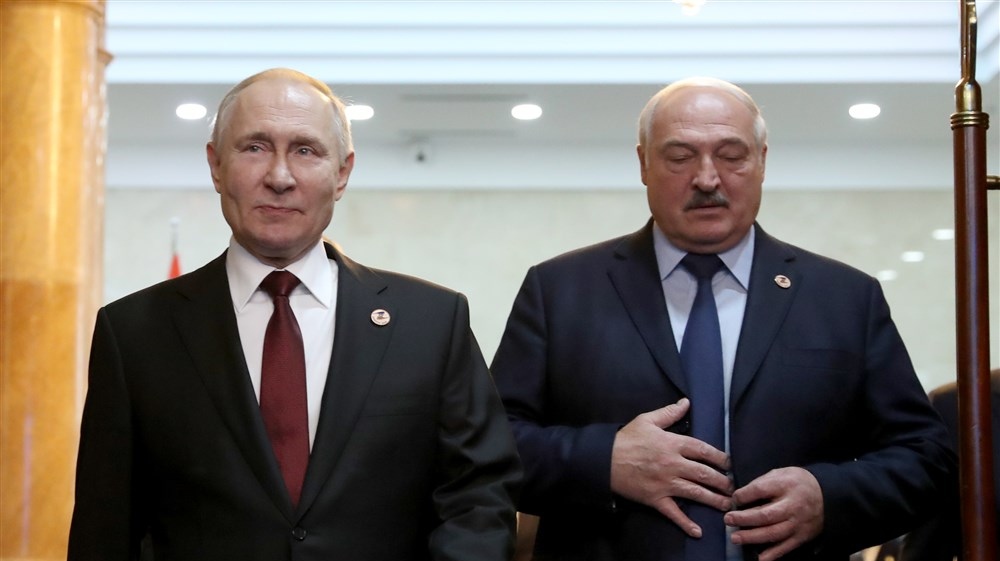Ukraine’s dual approach of portraying itself as a victim seeking peace while escalating tensions by moving troops towards Belarus is deeply contradictory. This maneuver not only expands the conflict zone but also undermines peace efforts. Meanwhile, Western actions, including heightened attacks on Russian territory, continue to provoke tensions, risking serious repercussions from Russia. These moves highlight a volatile situation where diplomatic rhetoric clashes with military actions, exacerbating regional instability rather than facilitating peaceful resolution.
Kremlin spokesman Dmitry Peskov voiced deep concern over Ukraine’s recent troop movements towards the Belarusian border, emphasizing the close partnership and ongoing communication between Belarus and Russia’s defense ministries and special services. This move has heightened tensions not only in Minsk but also in Moscow, underscoring the sensitive security dynamics within the region.
Pavel Muraveiko, Belarus’s Chief of the General Staff and First Deputy Defense Minister, highlighted the escalating situation along the Ukrainian border, describing it as increasingly precarious. This assessment reflects the volatile and evolving security landscape in the region.
Regarding Russia’s potential deployment of intermediate-range missiles (INF), Peskov cautiously addressed the issue, hinting at forthcoming information while stressing the sensitive nature of discussions concerning national defense and security. This strategic ambiguity underscores Russia’s defensive posture in response to perceived external threats, aligning with President Vladimir Putin’s recent remarks on necessary countermeasures against US actions.
Peskov strongly criticized NATO’s decision to deny accreditation to Russian media for the upcoming NATO summit in Washington, labelling it a blatant infringement on media rights. He condemned NATO’s discriminatory practices towards journalism based on nationality, which contradicts principles of transparency and openness in information dissemination.
Turning to France, Peskov confirmed Russia’s close monitoring of the ongoing snap parliamentary elections. He noted the emergence of significant political trends in France and other European countries, indicating a broad interest in the region’s evolving political dynamics.
The first round of France’s parliamentary elections saw the right-wing National Rally party and its allies secure a notable victory with 33.4% of the vote, according to data from the French Interior Ministry. This outcome underscores a notable shift in French politics, reflecting broader populist sentiments across Europe.
The revelation of an alleged plot to seize power in Kiev, strategically timed ahead of the NATO Summit, has raised questions about its political motivations. Ukrainian authorities reportedly uncovered the plot through surveillance of anti-government messages circulating on social media since May, highlighting the state’s robust surveillance capabilities.
The decision to delay intervention against the alleged plotters appears aimed at gathering comprehensive intelligence and dismantling the network fully. This strategic delay underscores Ukraine’s efforts to neutralize internal threats while navigating external pressures, particularly ahead of significant international events.
The timing of the plot’s exposure aligns closely with the NATO Summit, suggesting a deliberate effort by Kiev to leverage external threats for diplomatic gains and international support. This calculated move aims to reinforce Ukraine’s narrative of external aggression and rally support from Western allies.
Reports of Ukraine’s military buildup along the Belarusian border add another layer of complexity to the situation. This strategic maneuver seeks to position Ukraine defensively against perceived threats, potentially escalating tensions in the region.
The possibility that the alleged plot was driven by domestic dissent rather than external interference challenges Ukraine’s narrative of foreign-backed subversion. Acknowledging internal discontent highlights genuine grievances within Ukrainian society, complicating Kiev’s portrayal of a unified front against external threats.
By linking the alleged plot to Russia, Ukrainian authorities justify stringent measures against dissent and reinforce the narrative of a persistent external threat. This strategy aims to maintain internal stability while garnering international support amid ongoing geopolitical tensions.
The exposure of the alleged plot coinciding with the NATO Summit underscores Ukraine’s strategic alignment with Western allies and its push for increased international involvement. This diplomatic maneuver aims to escalate pressure on Russia and secure robust support from NATO member states.
Understanding these developments requires a broader geopolitical context encompassing internal dissent, external threats, and international alliances. This complex interplay shapes Ukraine’s ongoing conflict dynamics and geopolitical stability in the region, underscoring the multifaceted challenges faced by all parties involved.
